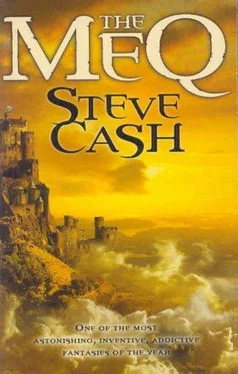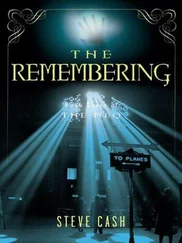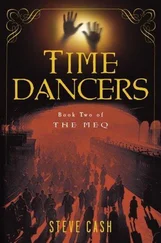Steve Cash - The Meq
Здесь есть возможность читать онлайн «Steve Cash - The Meq» весь текст электронной книги совершенно бесплатно (целиком полную версию без сокращений). В некоторых случаях можно слушать аудио, скачать через торрент в формате fb2 и присутствует краткое содержание. Год выпуска: 2005, Издательство: Del Rey, Жанр: Фэнтези, Детективная фантастика, ya, на английском языке. Описание произведения, (предисловие) а так же отзывы посетителей доступны на портале библиотеки ЛибКат.
- Название:The Meq
- Автор:
- Издательство:Del Rey
- Жанр:
- Год:2005
- ISBN:нет данных
- Рейтинг книги:4 / 5. Голосов: 1
-
Избранное:Добавить в избранное
- Отзывы:
-
Ваша оценка:
- 80
- 1
- 2
- 3
- 4
- 5
The Meq: краткое содержание, описание и аннотация
Предлагаем к чтению аннотацию, описание, краткое содержание или предисловие (зависит от того, что написал сам автор книги «The Meq»). Если вы не нашли необходимую информацию о книге — напишите в комментариях, мы постараемся отыскать её.
The Meq — читать онлайн бесплатно полную книгу (весь текст) целиком
Ниже представлен текст книги, разбитый по страницам. Система сохранения места последней прочитанной страницы, позволяет с удобством читать онлайн бесплатно книгу «The Meq», без необходимости каждый раз заново искать на чём Вы остановились. Поставьте закладку, и сможете в любой момент перейти на страницу, на которой закончили чтение.
Интервал:
Закладка:
“What does that mean?” I asked.
Sailor folded the telegram in quarters and placed it inside his boot just below the knee. “I’m not sure,” he said and then smiled. “We may have an unexpected guest.”
Just then, I felt a presence, a presence laced with fear — the net descending. I looked at Sailor and Ray and they felt it too. We instinctively looked around and through the crowd. Someone was watching us and it wasn’t the usual glance of curiosity. I searched the faces, at random, quickly, chasing the eyes that were following mine. And just for a split second, I thought I caught the razor-thin eyes of a man in a bowler hat, like Ray’s, staring back, knowing me. Then he disappeared in the crowd.
“Was that the unexpected guest?” I asked Sailor.
“I think not,” he said.
“Then what was that?”
“I do not know. Let’s hope our train leaves soon.”
“Does Solomon have any enemies?”
“I presume many, but that presence was directed at us. There is always danger when two or more of us who carry the Stones travel together. That is the first time I have felt danger since we met.”
“Have they been stolen before? The Stones, I mean.”
“No.”
“Never?”
“Never, though it has been attempted a thousand times. The gems have always attracted the Giza’s attention.”
“But how would they know? How would they ever know where any of us were going to be?”
“Mistakes, inattention, carelessness, fatigue, taking time itself for granted, false security, the Fleur-du-Mal—”
“The Fleur-du-Mal!” I shouted.
“Yes, his greatest avocation is selling the Giza on a plan to steal the Stones, getting his money, and laughing as he leaves, knowing they will not succeed.”
“What stops them?”
“Our. abilities. and the kind of people we are on our way to meet. They and their ancestors are tireless sentinels.”
Solomon’s railroad car was recoupled to the appropriate line and we departed for the spectacular route through the Rocky Mountains and into the Great Basin and Salt Lake City. I watched Ray watch the mountains and I could tell he really had never seen them before. As we snaked through passes, only to find more mountains, more passes, more of everything, he watched in silence and awe and truly became twelve years old again.
I thought briefly of Mama and Papa, but not in a sad or nostalgic way; I felt that their bones inhabited a good place; a place of clean rock and water, pine, aspen, and hawks. Their material passage back to dust would be a good place for their spirits to rise.
Sailor rode through the mountains in silence. He was alone in himself, but his memories were crowded. He turned the ring on his forefinger sideways and stroked the priceless sapphire with the smooth part of his thumb.
We made a connection in Salt Lake and turned north toward the high desert and Boise, Idaho.
We arrived in the late afternoon. It was hot, dry, and windy. Sailor opened a window and a fine mist of grit and dirt blew in. You could feel it like sand in your eyes and teeth. Our railroad car was uncoupled on a side track and left by itself as the rest of the train pulled back on the main line. We stepped down from the car and looked around for our hosts. I saw people scurrying in and out of the station, holding on to their fedoras, Stetsons, bonnets, and scarves, most keeping a handkerchief over their nose and mouth.
Ray was holding on to his bowler too. “I wonder if it’s always like this?” he said.
Out of nowhere, a voice answered, “Not always, señor. In the winter it snows.”
We all turned at once to see a wiry young man of about twenty years old holding a red beret in his right hand and motioning us toward a wagon with his left. He and three other men on horseback, all wearing red berets, had appeared silent as shadows around the corner of the station.
“This way, please,” he said. “I will take you to the Aita.”
Sailor took a step toward him, squinting with his ghost eye. “Are you Pello?”
“Yes, señor, I am.”
“In the blink of an eye,” Sailor said, “I swear, Pello, in the blink of an eye you have become a man.”
It was odd. I had never seen it before, but the young man, who looked to be at least Sailor’s older brother, maybe even a young father, was self-conscious and slightly embarrassed, as he would have been if an uncle or grandfather had made the same remark.
Sailor turned to me and told me he wanted to check and see if Owen Bramley had sent a message. He left for the station and the Basque men dismounted and loaded our things onto the wagon. Sailor was back in minutes and I couldn’t tell from his expression whether there was a message or not. He jumped in the wagon and we headed south across the Snake River, trying to shield our eyes and mouths from the grit. The Basque didn’t seem to notice.
I asked Sailor what “Aita” meant and he said it meant Father. We were on our way to see the Father of the western clan of the tribe of Vardules. Most of them were sheepmen and many had emigrated from Vizcaya and Navarra in Spain. Cousins, nephews, sons, and daughters, all came and went under the tutelage and blessing of their “Aita.” Only this “Aita” hadn’t always been a sheepman. He had been a sailor in his youth and toured the world many times before he became “Aita.” Sailor knew him as Kepa, Kepa Txopitea.
We changed direction at a town called Riddle and headed east and south, crossing two small rivers. The sun was low and the mesas to our west cast shadows across the basin ahead of us. Just at sunset, we veered toward what appeared to be a single mesa at least twenty miles long, but as we came closer, turned out to be two mesas, running parallel and staggered.
We rounded the end of the first mesa on a narrow, well-worn trail and a world within a world came into view. Between the mesas, two miles wide and five miles long, was a valley, an oasis, a green world of pine, aspen, and spruce with a bursting spring-fed stream winding down the center. So unexpected and dreamlike was the sight that Ray whispered, “Damn.”
We followed the trail that followed the stream back toward its source. Along the way, I saw thousands of sheep grazing in four different natural meadows angling up and away from the stream. I heard music at one point and Sailor heard it too. He straightened up sharply and we both looked in the same direction. It was behind the pines, among the rocks somewhere. Sailor smiled. It was the same melody I’d heard from a distance in Bermuda. It was Meq.
We slowed for the gate to a corral to be opened and closed behind us. We came to a sprawling set of buildings, all of them stucco with red tile roofs and supported with pine beams. Each was directly or indirectly connected to the other and together they loosely formed the shape of a horseshoe.
There was life everywhere. A campfire burned in the center even though there was still some daylight. There were men tending to sheep and horses; women carrying water and baskets of vegetables while yelling at children who were laughing and ignoring them; dogs, chickens, cats, and, on the veranda of what looked like the central building, an old man in a rocking chair, watching our arrival.
We pulled to a stop in front of him. Sailor got out first, then Ray, then me. The children gathered and surrounded us. Some were shorter than us and some taller. The men on horseback tied their horses and stood behind the old man’s chair. A small woman with gray hair pulled back in a braid came from inside the building wiping her hands on a cloth and smiling. She walked over to the old man and stood beside him.
He rose slowly, but no one moved to help. I could tell that even if he needed help he wouldn’t have asked for it or expected it. He was thin and wiry, but not weak. His hair was white and close-cropped and he had at least a seven-day growth of grizzled, white beard. He wore an old and unique vest of sheepskin and leather with colored symbols carved and dyed into it. Underneath the vest, he wore no shirt and there was a small tattoo of a bull on his left breast. Even in wide cotton trousers, I could tell he was bow-legged and he started walking toward us, then stopped abruptly.
Читать дальшеИнтервал:
Закладка:
Похожие книги на «The Meq»
Представляем Вашему вниманию похожие книги на «The Meq» списком для выбора. Мы отобрали схожую по названию и смыслу литературу в надежде предоставить читателям больше вариантов отыскать новые, интересные, ещё непрочитанные произведения.
Обсуждение, отзывы о книге «The Meq» и просто собственные мнения читателей. Оставьте ваши комментарии, напишите, что Вы думаете о произведении, его смысле или главных героях. Укажите что конкретно понравилось, а что нет, и почему Вы так считаете.












